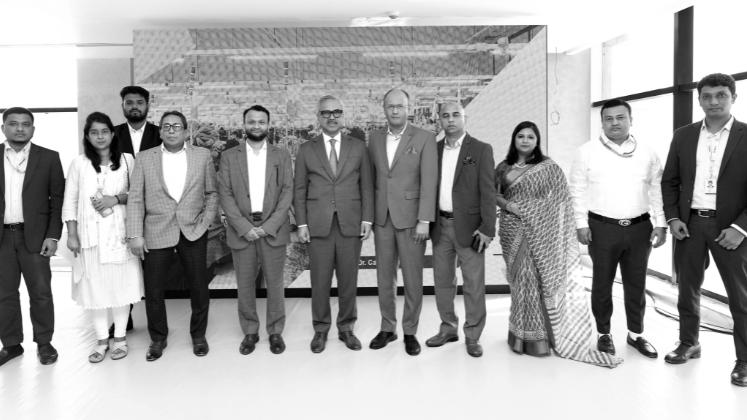Bangladesh’s RMG industry has excelled in the field of sustainability, and the noteworthy aspect is that, without complacency, both individual and collective efforts persist, enhancing the sustainable efforts. One such initiative is BGMEA’s Responsible Business Hub (RBH) unit, a part of the Future Center, which was launched recently.
Nestled within BGMEA, the Future Center oversees projects related to sustainability and socio-economic aspects of the industry. These projects aim to ensure the industry’s long-term sustainability and prosperity. The RBH unit, established in both the Dhaka and Chattogram offices of BGMEA, is poised to play a vital role in realising Bangladesh RMG industry’s Sustainability Strategic Vision 2030.
This unit is the primary resource for its members regarding any inquiries related to matters concerning environmental and human rights as well as evolving compliance legislation on sustainability. Right now, a fantastic team of six hardworking individuals, overseen by Sheikh H.M. Mustafiz (Chairman, Standing Committee on Sustainability, BGMEA) and Wasim Zakariah (Chairman, Standing Committee on SDG Affairs, BGMEA), is at the forefront. They’re providing advisory support, raising awareness and guiding manufacturers on Human Rights and Environmental Due Diligence (HREDD) standards. It’s a bold step in line with BGMEA’s commitment to drive positive changes in the RMG industry.
Reasons for starting the RBH unit
Every day, the European Union (EU) rolls out strict sustainability laws. The most recent addition, the EU Corporate Sustainability Due Diligence Directive, given the green light in 2022, is set to come into effect across Europe in 2024. This directive will make it obligatory for businesses throughout the continent to adhere to human rights and environmental due diligence standards.
Given the significant presence of several major fashion brands in Europe, coupled with the fact that over 50 per cent of Bangladesh’s RMG sector exports head to the EU, the upcoming environmental regulations are poised to impact the country’s apparel sector. Brands and retailers subjected to due diligence regulations in Germany and other countries are expected to tighten their criteria for suppliers, such as risk assessments and supply chain transparency.
| Nestled within BGMEA, the Future Center oversees projects related to sustainability and socio-economic aspects of the industry. These projects aim to ensure the industry’s long-term sustainability and prosperity. The RBH unit, established in both the Dhaka and Chattogram offices of BGMEA, is poised to play a vital role in realising Bangladesh RMG industry’s Sustainability Strategic Vision 2030. |
Therefore, factory managers and sustainability officers are eager to gain a deeper understanding of their responsibilities related to responsible business practices. They also need access to certified guidance. The RBH unit plans to play a big role in meeting these needs by creating a special section just for sustainability and due diligence, providing these services to its members.
“Expected to be enacted in the coming years, this EU initiative will mandate companies to address adverse impacts in their supply chains globally. In response to these regulatory shifts, the BGMEA has established an RBH unit,” says Sheikh H.M. Mustafiz, while adding, “To prepare for future business interactions with German and European companies, manufacturers embracing these changes will be well-positioned.”
Training is the key
Picture a centre that transforms due diligence and sustainability into something exciting! It’s not your typical training; it’s a whole new approach where the RBH unit brings in a fresh perspective, blending training programmes with a spotlight on Environment, Social and Governance (ESG) initiatives.
In getting factories onboard with HREDD and Sustainability Data Management, this initiative places various training programmes at the forefront. BGMEA recently organised a factory onboarding event, drawing in 85 participants from 52 factories.
But here’s the essence – this training isn’t a mere checkbox exercise. It’s about empowering professionals diving into Key Performance Indicators (KPIs), transforming them into more than just numbers. It’s a deep dive into the ESG sector, learning how to gather and measure data, interpret it accurately and spot common errors.
And the spotlight is on the Human Rights and Environmental Due Diligence masterclass. The unit is simplifying the fundamentals, taking the intimidation out of due diligence. Guiding principles become its toolkit and the OECD Due Diligence checker serves as its guide. When it comes to supply chain mapping and risk assessment, think of them as the tools necessary to create a positive impact.
When the day wraps up, these professionals don’t just depart as trainees – they leave feeling empowered. They’re equipped to steer their garment factories through the currents of change.
“The positive impact of our effort and training is that experts are there to guide and to overcome whatever challenge professionals face in the implementation of sustainable initiatives. The RBH unit is working to develop an online data disclosure platform that will be functionalised and implemented for collecting and publishing data on ESG performance. It will work as a one-stop service intended to give value to BGMEA members and promote consistency and continuity in BGMEA’s sustainability initiatives,” concludes Wasim.

















